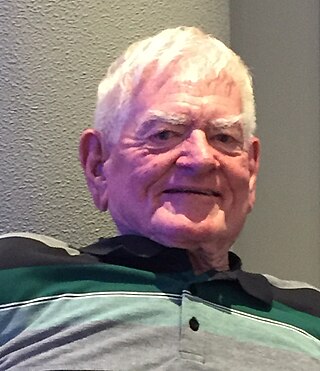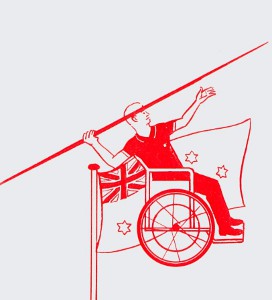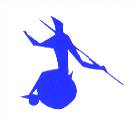Francis Ettore Ponta was an Australian Paralympic competitor and coach. He competed in several sports including basketball, pentathlon, swimming and fencing. A paraplegic, he lost the use of both his legs after a tumour was removed from his spinal column when he was a teenager. Ponta was a member of Australia's first national wheelchair basketball team, and is credited with expanding the sport of wheelchair basketball in Western Australia. At the end of his competitive career, he became a coach, working with athletes such as Louise Sauvage, Priya Cooper, Madison de Rozario, Bruce Wallrodt and Bryan Stitfall. He died on 1 June 2011 at the age of 75 after a long illness.

Australia competed at the 1968 Summer Paralympics in Tel Aviv, Israel. The Games significantly expanded in 1968 when compared to previous years, as did the Australian team and the events included in the Games. Mexico City were originally to host the 1968 Paralympics, however, they were moved to Tel Aviv in Israel.

Australia sent a team to compete at the 1972 Summer Paralympics in Heidelberg, West Germany. Australian won 25 medals - 6 gold, 9 silver, and 10 bronze medals in six sports. Australia finished 11th on the gold medal table and 9th on the total medal table.

Angela Ballard is an Australian Paralympic athlete who competes in T53 wheelchair sprint events. She became a paraplegic at age 7 due to a car accident.

William "Bill" Edgar Mather-Brown is an Australian Paralympian. He was born in the Western Australian city of Fremantle in 1936. At the age of two, he contracted polio in the town of Agnew in the Goldfields-Esperance region, northeast of Kalgoorlie. He spent two years in Kalgoorlie Hospital before moving back to Perth. He married Nadine Vine, who attended the 1972 Heidelberg Games as a team nurse.

Daphne Jean Hilton was an Australian Paralympic competitor. She was the first Australian woman to compete at the Paralympic Games. She won fourteen medals in three Paralympics in archery, athletics, fencing, swimming, and table tennis from 1960 to 1968.

Michael Dow is an Australian Paralympic swimmer and weightlifter who won two gold, two silver and a bronze medal at the 1964 Summer Paralympics. He was one of only two Victorian athletes selected to compete at these games.
Lorraine McCoulough-Fry was an Australian Paralympic swimmer, athlete and table tennis player.

Also known as the 13th Stoke Mandeville Games, the 1964 Summer Paralympics was the 2nd Paralympic Games. Hosted in Tokyo, the games ran from 8 to 12 November. Australia won a total of 30 medals and finished fourth on the medal tally behind Italy (3rd), Great Britain (2nd) and the United States (1st). Australia competed in 6 of the 9 sports at the Games, winning medals in each of those sports, but was most successful in the pool, winning a majority of their medals in swimming events.

John Martin is an Australian Paralympic archer, athlete, table tennis player, wheelchair basketballer and wheelchair fencer who won three silver medals at five Paralympics. He was born in England and emigrated to Australia with his family at the age of 13.
Eric Boulter is an Australian swimmer, athlete, and wheelchair basketball player who won two medals at the 1972 Heidelberg Paralympics.

The Commonwealth Paraplegic Games were an international, multi-sport event involving athletes with a disability from the Commonwealth countries. The event was sometimes referred to as the Paraplegic Empire Games and British Commonwealth Paraplegic Games. Athletes were generally those with spinal injuries or polio. The Games were an important milestone in the Paralympic sports movement as they began the decline of the Stoke Mandeville Games' dominating influence. The event was first held in 1962 and disestablished in 1974. The Games were held in the country hosting the Commonwealth Games for able-bodied athletes, a tradition eventually fully adopted by the larger Olympic and Paralympic movements.

The First Commonwealth Paraplegic Games were held in Perth, Western Australia, from 10 to 17 November 1962. These Games preceded the 1962 British Empire and Commonwealth Games which were held in Perth from 22 November to 1 December of that year. The Commonwealth Paraplegic Games were conceived by George Bedbrook after Perth won the right to host the Commonwealth Games. Great support was received from Royal Perth Hospital, a leading spinal rehabilitation centre in Australia.

Terry Mason is an Australian Paralympic athlete and weightlifter, who won two bronze medals at two Paralympics.
Bruce Oliver Thwaite was an Australian Paralympic competitor. During World War II, he sustained a spinal injury when he landed on a tree after parachuting from a bomber plane over Germany. He was treated at the Stoke Mandeville Hospital.

Raymond Barrett was an Indigenous Australian Paralympic athlete left a paraplegic following a car accident. Prior to this he was a champion juvenile athlete in able-bodied sports. A bronze medalist at the 1972 Summer Paralympics Heidelberg Germany, a high achiever at the Stoke Mandeville Games England, Commonwealth Paraplegic Games, National Paraplegic and Quadriplegic Games, FESPIC Games and State selection trials. A sporting complex in the Sutherland Shire of Sydney is named in his honor. The people of this Shire were his 'significant others'.
Kevin Cunningham was an Australian Paralympic athlete. A member of Australia's first Paralympic Games team, he participated at the 1960 Rome and 1968 Tel Aviv Paralympic Games.

The Third Commonwealth Paraplegic Games was a multi-sport event that was held in Edinburgh, Scotland from 26 July to 1 August 1970. Dubbed the "little games", they followed the 1970 British Commonwealth Games which were held in Edinburgh from 16 to 25 July of that year.

Charlene Stuart Meade was an Australian athlete who became the first Australian woman to participate in the Stoke Mandeville Games, the precursor to the Paralympic Games. She finished second amongst women in the archery event, and later competed in the 1959 edition in para-swimming, archery and javelin. At the 1974 games, she won a silver medal in table tennis. Todman later became active in dog sports.

The second Commonwealth Paraplegic Games were held in Kingston, Jamaica from 14 to 20 August 1966. There were 133 athletes from 10 countries. The Games were opened by Prince Philip.















